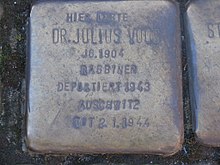Julius Voos

Julius Voos (born April 3, 1904 in Kamen , Westphalia province ; † January 2, 1944 in Auschwitz III Monowitz concentration camp ) was a German cantor , rabbi and educator .
Life
Julius Voos was born in 1904 as the eldest son of Schochet Jakob Voos. From 1910 he attended the Evangelical Diesterweg School in Kamen . At Easter 1918 he joined the preparation institute of the renowned Marks-Haindorf Foundation in Münster . From Easter 1924 to 1928 he worked as a religion teacher and cantor in Meisenheim (Palatinate). But it was not until October 1928 that he passed the final exam at the secondary school in Idar-Oberstein . He then studied at the University for the Science of Judaism and at the Friedrich Wilhelms University in Berlin. At the same time, he was already giving religious instruction on behalf of the Jewish community . After changing university to Bonn , he did his doctorate there on a topic from medieval Jewish religious history. Back in Berlin, he passed the rabbinical examination there. In 1938 he worked as a cantor in Guben (Brandenburg) and had to witness the November pogroms there in 1938 .
On December 13, 1938, he was imprisoned in Sachsenhausen concentration camp.
As the successor to Fritz Leopold Steinthal , Voos rose to become the last headmaster of the Marks Haindorf Foundation in 1939. Until he moved to Bielefeld on March 30, 1942, he taught the remaining Jewish children. In Bielefeld, the Voos family lived in the so-called Judenhaus in Detmolder Strasse.
Although he was rabbi of the Bielefeld community until 1943, he was obliged to do forced labor in a vehicle factory before he was deported to the Auschwitz concentration camp on March 2, 1943 . Julius Voos died there as a result of forced labor. His wife and son were killed in the gas chambers .
Works
- David Reubeni and Salomo Molcho: a contribution to the history of the messianic movement in Judaism in the first half of the 16th century, Bonn 1933, OCLC 923839028 (Inaugural dissertation Rheinische Friedrich-Wilhelsuniversität 1933, 69 pages).
literature
- Susanne Freund: Jewish educational history between emancipation and exclusion. The example of the Marks Haindorf Foundation in Münster (1825–1942) . Research on regional history. Ferdinand Schöningh-Verlag, Paderborn 1997. pp. 342-343.
- Gisela Möllenhoff: Memories of Dr. Julius Voos . In: Auf Roter Erde , New Episode 18, December 1, 1993 and Gisela Möllenhoff / Schlautmann-Overmeyer: Jewish Families in Münster , Part 1, pp. 479f.
Web links
- Memorial book, Federal Republic of Germany. In: Memorial Book, Federal Republic of Germany.
Individual evidence
| personal data | |
|---|---|
| SURNAME | Voos, Julius |
| BRIEF DESCRIPTION | German rabbi and victim of National Socialism |
| DATE OF BIRTH | April 3, 1904 |
| PLACE OF BIRTH | Kamen , Province of Westphalia |
| DATE OF DEATH | January 2, 1944 |
| Place of death | Auschwitz I concentration camp (main camp) |